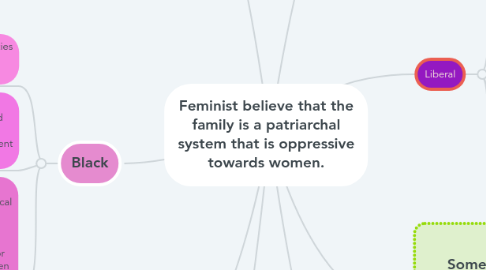Feminist believe that the family is a patriarchal system that is oppressive towards women.
저자: Farzana Uddin

1. Radical
1.1. Patriarchy enables male domination and women must fight back in order to be from the repressive system.
1.2. Firestone (1970) believes that creating technology that allows women to reproduce without men will eliminate discrimination. This implies that the dependency on men for reproduction is the reason why there is a patriarchal system.
1.3. Greer shows that divorce rates are evidence that marriage makes women unhappy which a contradiction of the strong ideology that a womens job is to make her husband happy.
2. Liberal
2.1. Sees legal agencies as way to bring equality towards women. For example, equal pay, anti-discrimination polices, and and protection from abuse.
2.2. Somerville states that women have more rights than radical feminists imply. She shows that women are unjustifiably hateful towards men even though there is greater equally in marriages.She believes that long working hours to do help with the well-being of the family.
2.3. Sue Sharpe and Rosalind Delmar postulates that are gender division and men have disadvantages as well. Legislation is supposed to be used a tool to ensure equality for both genders.
3. Marxist
3.1. A capitalistic system enables economic inequalities for women.
3.2. As more women are going into the workforce they are being exploited and at home they are "unpaid workers" that serve their family. Duncombe and Marsden (1993) states that women work harder than men because they spend more time, effort, and emotional work to ensure the well-being of the family.
3.3. Going off of Parsons' stabilizing adult personalities, husbands get frustrated by a capitalitic environment and the wife provides comfort to them according to Ansley. Women's oppression imprisons them into being a man's caretaker.
4. Black
4.1. Black women have less opportunities than white women have different experience with discrimination.
4.2. Amos and Parmar (1984) states that a womens ethnicity impacts family life and their experiences with the family. This reinforces that Black women have different experience than white women.
4.3. A book called "Black Feminist thought" illustrate that Black women have a historical disadvantage compared to white women with slavery being a contributing factor. These past disadvantages have slightly translated into the current experiences for black women reinforcing that Black women have less opportunities than white women.
5. Black feminist criticise liberal feminist because using legislation to fix women's issues will not help black women. The legislation is deeply rooted in racism.
6. Somerville states women have more rights than what radical feminists imply because marriages between men and women are becoming more equal.
7. India is Patriarchal because they have always shown a preference towards male children to be the "leader" of household. However in southern India there are matrilineal communities. Nairs give older female control and their husbands stay in separate house or room. Women usually do not have the liberty to make her own decisions regarding work and is decided by her husband and in-law. Women education is promoted and education is free for women up to the age of 16. Women are taught to take care of children, cook, and clean. They are the care takers of the household.
8. China is patriarchal, men hold most of the power within the country. China is patrilineal because many women get forced abortions so the sex of children are men. Women's education is becoming more accessible which implies that education is important for women. China has one of the highest rates for women working in the Aisa-pacifics even though women are the primary caregivers.


